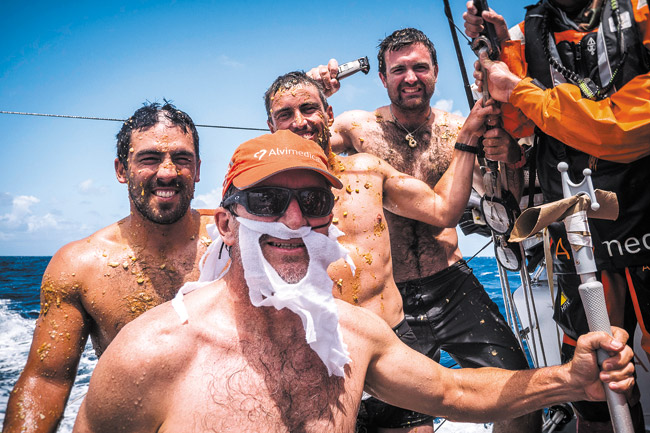Crossing The Equator For King Neptune

King Neptune makes a visit to Team Alvimedica to welcome (from left) Mark Towill, Alberto Bolzan and Charlie Enright as they sail across the equator for the first time. Will Oxley is bearded King Neptune AMORY ROSS / TEAM ALVIMEDICA / VOLVO OCEAN RACE photo
Kahaluu’s Mark Towill is sporting a new hairdo these days, and he couldn’t be more proud. His “inverted mohawk” may not be the most desirable or popular haircut at your local barber-shop, but for Towill, it’s absolutely perfect.
“In the context of the race it definitely has got some symbolism to it,” says Towill of his new haircut. “Everybody who crosses the equator for the first time has to (make) an offering, and this was certainly mine!”
The Punahou graduate is in the midst of an ocean battle. He and other sailors on seven boats are taking part in the Volvo Ocean Race, a 40,000-nautical-mile yacht race around the world.
The 26-year-old Towill is the captain and general manager of Team Alvimedica, a U.S. entry, sponsored by a Turkish medical company and featuring four Americans on board.
Towill has more than 15,000 nautical miles of offshore racing and six major ocean crossings under his belt, but recently experienced a first when his team crossed the equator.
“Crossing the equator for the first time, especially during the Volvo, I think it’s definitely a rite of passage,” says an excited Towill, who sailed competitively while attending Brown University. “There probably aren’t many people who’ve done that, and it feels certainly special to be a part of that club. So to have sort of a stamp on your head to prove that you did it makes it all that more interesting.”
According to veteran sailors, crossing the equator has great meaning. From a sailing point of view, it means leaving the Doldrums and its light ocean currents and winds, and catching a ride with the trade winds.
But from a mythical point of view, crossing the equator for the first time for a mariner is a way to honor sea god King Neptune.
Towill wasn’t the only one. Skipper Charlie Enright and helmsman Alberto Bolzan also were newbies across the equator. All three were initiated into the world of ocean racing with what’s called the “King Neptune Ritual.”
The ceremony calls for a sacrifice to Neptune in hope of a safe journey and favorable winds. Navigator Will Oxley played the role of Neptune, while Towill, Enright and Bolzan were showered with what was described as a “special brew of old freeze-dried food.”
And while the thought of being doused by pieces of fish may make most people cringe, the festivities marked a huge moment in Towill’s sailing career.
“It was something that I’ve never done before, something that I’ve dreamed about doing for a long time, so kind of cool to check that box, especially during this race,” says Towill from his post on the vessel.
“Kind of looking forward to doing it again, hopefully on a boat with some people who haven’t done it before so I can shave their heads!”
The first leg of the race, which happens every three years, has teams sailing from Alicante, Spain, to Cape Town,
South Africa, nearly 6,500 miles away. Crews are expected to be at sea for nine months, visiting ports in Brazil, China, France, United Arab Emirates, New Zealand, Newport, R.I., Portugal and ending in Sweden.
So far, each team has led at one point in the race.
Towill’s quote on the team’s home page says it all: “There is always a little bit of fear just in the fact that it is something we have never done before, but I think a little bit of fear is healthy.”
rkmizutani@gmail.com





